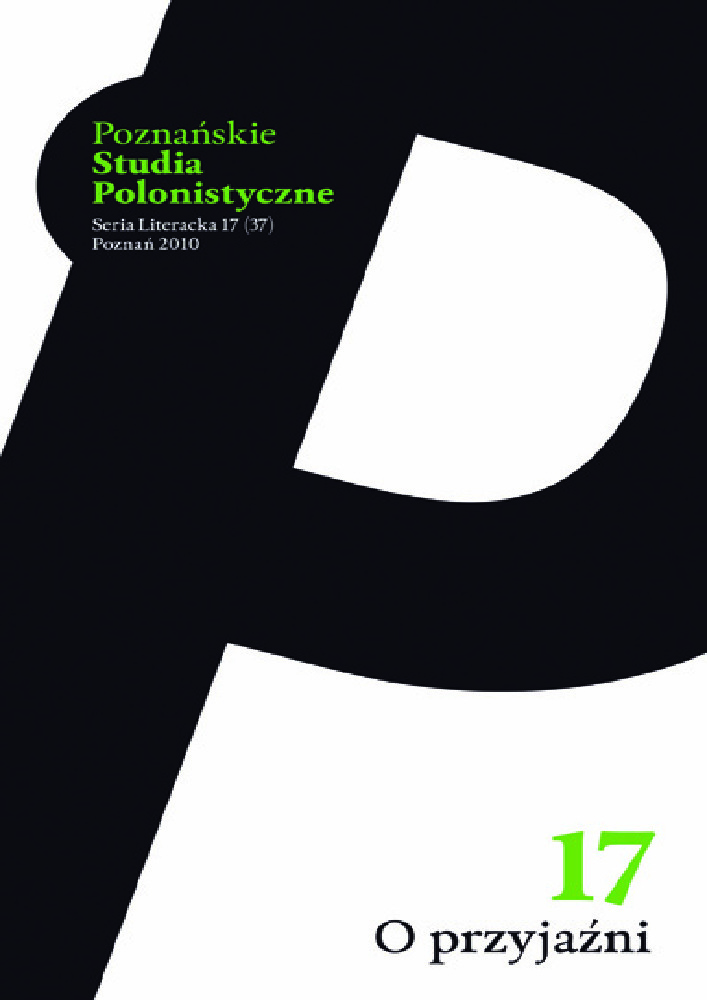Abstrakt
For Aristotle, the bond of a valuable friendship was created for the sake of its own value of giving friendship or the experience it furnishes, and not for the sake of expediency or the sheer joy of sharing friendship. A sustainable friendship basically finds its roots in what a human being is. Hence, it is loving rather than being loved that makes people real friends, ethically perfect. Biblical authors knew that a true friendship was difficult to obtain and that it could easily be lost. Thus, for their readers, to observe their advice means to obtain valuable hints and guidelines and to be protected from disillusionment. These guidelines had been drawn by them from the experience of everyday life, as a result of watching and drawing conclusions from what they saw following different man’s response to different situations. Might they have been victims to unjust action themselves, or had they committed something that made them feel ashamed, but kept that it in their mind as a warning to their prospective readers? Whatever the answer is, they managed to draw conclusions from the experience that, ultimately, could be helpful in making those who would perpetrate something that would hurt or kill a friendship repent.
Bibliografia
Barton J., Buddiman J., The Oxford Bible Commentary, Oxford–New York 2007.
D’Hamonville D.M., Les Proverbes, w: La Bible d’Alexandrie, Paris 2000, s. 179–180.
Di Lella A.A., The Wisdom of Ben Sira. A New Translation with Notes by P.W. Skehan. Goldingay J., Psalms I. Psalms 1–41, Grand Rapids 2006.
Gauthier R.A., La morale d’Aristote, Paris 1958.
Höffe O., Aristoteles, München 1996.
Introduction and Commentary, New York–London–Toronto–Sydney–Auckland 1987.
Irwin T.H., Permanent Happiness: Aristotle and Solon, „Oxford Studies in Ancient Philosophy” 1985, nr 3, s. 89–124.
Kraus H.J., Psalms 1–59. A Commentary, Minneapolis 1988.
Langkammer H., List do Efezjan, w: Pismo Święte Starego i Nowego Testamentu w przekładzie z języków oryginalnych, Lublin 2001, s. 89.
Lelièvre A., A. Maillot, Commentaire des Proverbes III, Chapitres 1–9, Paris 2000.
Longman III T., Proverbs (Baker Commentary on the Old Testament Wisdom and Psalms), Grand Rapids 2006.
Meinhold A., Die Sprüche, t. 2, Zürich 1991.
Monan J.D., Moral knowledge and its methodology in Aristotle, Oxford 1968.
Nawrot J., Przyjaźń w „Etykach” Arystotelesa, w pismach mądrościowych Septuaginty oraz w Nowym Testamencie, Poznań 2004.
Potocki S., Rady mądrości, w: Jak rozumieć Pismo Święte, t. 5, Lublin 1998, s. 208.
Ravasi G., Psalmy. Psalmy 1–19 (wybór), cz. 1, Kraków 2007.
Scott R.B.Y., Proverbs, Ecclesiastes, New York 1965.
Synowiec J.S., Mędrcy Izraela, ich pisma i nauka, Kraków 1997.
Tronina A., Psałterz Biblii greckiej, Lublin 1996.
Waltke B.K., The Book of Proverbs 1–35, Grand Rapids 2004.
Wojciechowski M., Księga Tobiasza, czyli Tobita, t. 12, Częstochowa 2005.
Licencja
Autorzy
Autorzy tekstów przyjętych do publikacji w czasopiśmie „Poznańskie Studia Polonistyczne. Seria Literacka” są zobowiązani do wypełnienia, podpisania i odesłania na adres redakcji umowy o udzielenie nieodpłatnej licencji do utworów, z zobowiązaniem do udzielania sublicencji CC.
Zgodnie z umową, autorzy tekstów opublikowanych w czasopiśmie „Poznańskie Studia Polonistyczne. Seria Literacka” udzielają Uniwersytetowi im. Adama Mickiewicza w Poznaniu niewyłącznej i nieodpłatnej licencji oraz zezwalają na użycie sublicencji Creative Commons Attribution-NoDerivatives 4.0 International (CC BY-ND 4.0).
Autorzy zachowują prawa do dalszego, swobodnego rozporządzania utworem.
Użytkownicy
Zainteresowani użytkownicy internetu uprawnieni są do korzystania z utworów opublikowanych od 2016 roku w „Poznańskich Studiach Polonistycznych. Serii Literackiej” pod następującymi warunkami:
- uznanie autorstwa – obowiązek podania wraz z rozpowszechnionym utworem, informacji, o autorstwie, tytule, źródle (odnośniki do oryginalnego utworu, DOI) oraz samej licencji;
- bez tworzenia utworów zależnych – utwór musi być zachowany w oryginalnej postaci, nie można bez zgody twórcy rozpowszechniać np. tłumaczeń, opracowań.
Do wszystkich tekstów opublikowanych przed 2016 r. prawa autorskie są zastrzeżone.
Inne
Uniwersytet im. Adama Mickiewicza w Poznaniu zachowuje prawo do czasopisma jako całości (układ, forma graficzna, tytuł, projekt okładki, logo itp.).
